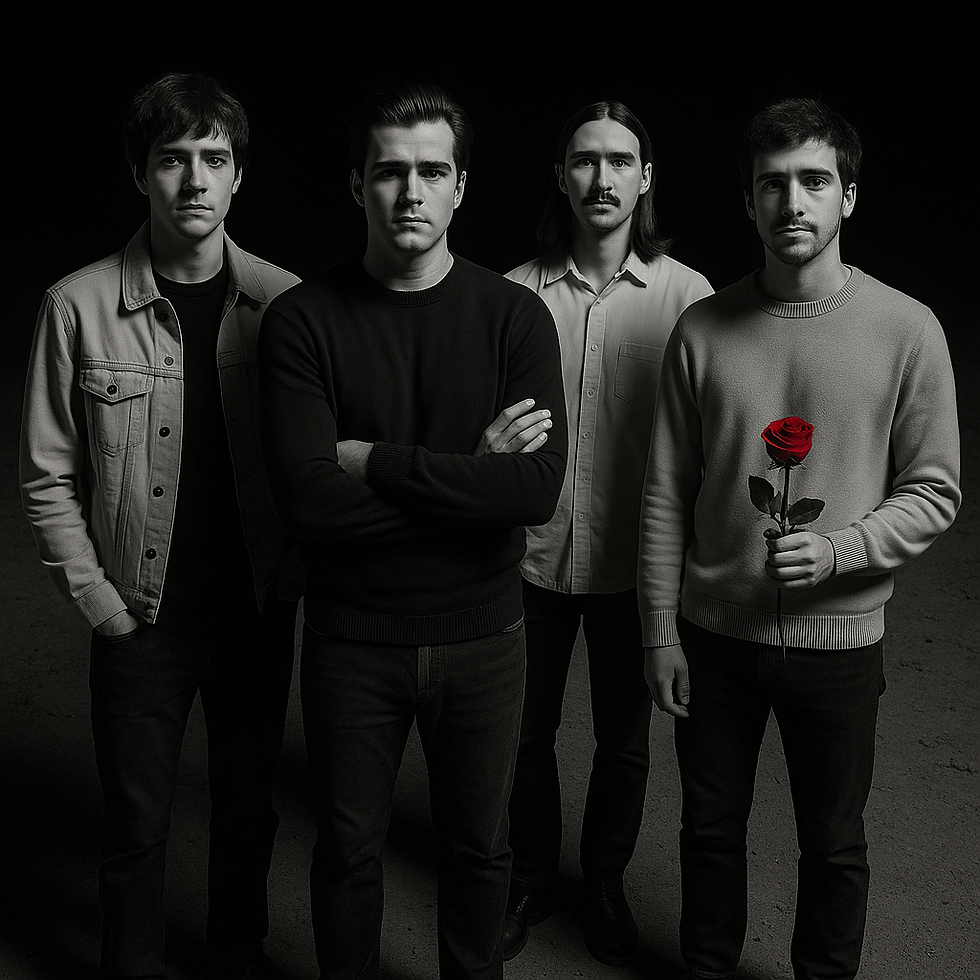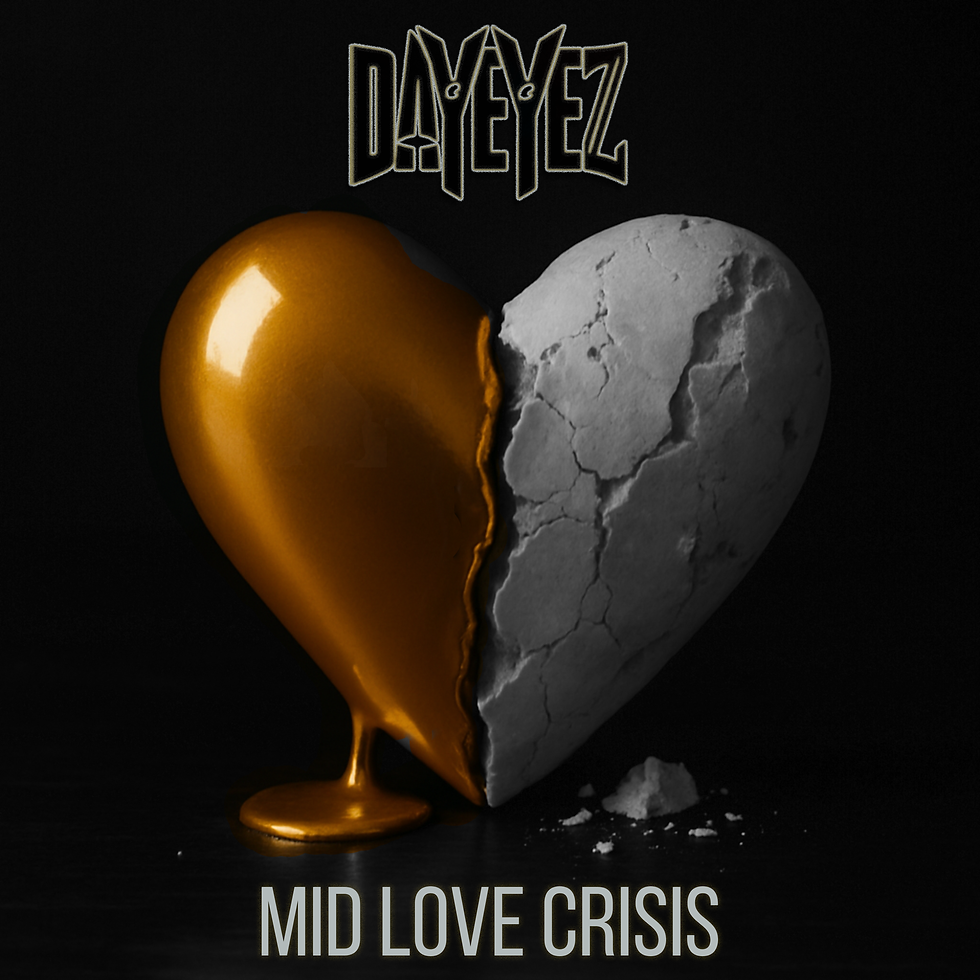DayEyez Unleashes Powerful Anthem "Grave" and Connects with Us on the Making of the Track
- STAFF

- Aug 16, 2025
- 6 min read

By: Staff
“Grave” is a haunting, unapologetically raw masterpiece that cements DayEyez as a genre-defining force.
DayEyez is back, and this time, the intensity is palpable. The brooding alt-rock anthem "Grave" drops today, and it’s already making waves with its raw, emotional energy. Known for pushing the boundaries of both sound and storytelling, DayEyez steps into darker, uncharted territory with this powerful new track. The song marks a significant turning point, exploring themes of guilt, loss, and letting go, while burying a broken past once and for all.
We spoke with the artist behind DayEyez, who gave us a glimpse into the personal journey that led to "Grave." From the emotional fallout that fueled its creation to the way AI and organic sound collided to bring its intense atmosphere to life, this interview dives into the heart of what makes DayEyez’s music so captivating.
How does the song’s heavy sound balance its emotional core? What does the concept of a "funeral" for a relationship mean in the context of this track? And, of course, what lies ahead after "Grave" as DayEyez prepares for their upcoming album, Mid Love Crisis?
Get ready to experience the creative process like never before. The answers reveal an artist who’s not afraid to confront their own darkness and share it with the world. Read on for an inside look at the making of "Grave" and what’s next for DayEyez.

Here’s how it went:
Begin Interview:
Hello DayEyez, we’re thrilled to have you here for this interview! We've had an amazing time exploring your music and diving into your creative journey. Now, we’re even more intrigued to get a deeper look into both your brand and your personal and professional inspirations.
Q. When did you first discover your talents, and what moment in your life shifted it from being something personal and intimate to recording with the intention of sharing it with a worldwide audience?
A. Music has always been a way to process the chaos around me. I’ve been writing since I was a teenager—quiet moments in the bedroom, long drives with melodies in my head. But the shift came when I started blending traditional songwriting with AI tools. Suddenly, I had a way to sculpt sound with precision, capture the emotion exactly how I heard it in my head. That’s when it stopped being just for me. I realized I could take these deeply personal experiences and deliver them in a way that felt universal. And once people started connecting with the early releases, I knew I had to keep going.
Q. 'Grave' feels like the final chapter in a difficult story. What was it like emotionally while writing this song?
A. It was heavy. Writing “Grave” felt like closing a door I’d been afraid to even admit was open. There wasn’t relief or catharsis—just the weight of acceptance. The feeling of finally being honest with yourself that something is over. It’s not an angry song. It’s not even sad in the traditional sense. It’s numb, resigned, like standing at the edge of something and knowing you’re not going back.
Q. You've mentioned not romanticizing your mistakes in 'Grave'. How do you find the balance between vulnerability and self-reflection in your lyrics?
A. I think there’s strength in owning your flaws without glorifying them. “Grave” isn’t about self-pity—it’s about holding up a mirror and saying, “This happened. I let it.” The challenge is being honest without turning it into a performance. That’s the tightrope I try to walk with every track: truthful, not dramatic.
Q. 'Grave' has such a cinematic feel. Was there a visual or scene in mind while creating it?
A. Definitely. The visual for "Grave" was actually very present from early on — and it became the cover art. I imagined two people standing on opposite sides of an actual grave, like a funeral for a relationship that finally reached the end. That scene, with the shovel stuck in the dirt and petals covering what's been laid to rest, guided the mood of the entire song. It’s somber, final, and symbolic. That visual helped keep the song grounded emotionally — like everything from the arrangement to the vocal delivery had to feel like it belonged in that moment.
Q. The idea of a “funeral” for a relationship is central in 'Grave'. How did that shape your songwriting?
A. The idea for the song really started with the title — “Grave” — which came from that feeling of needing to lay something to rest once it’s already dead. From there, the lyrics naturally formed around themes of burial, like shovels and dirt. I took a lot of the blame in the song because I knew it was over but didn’t have the spine to end it, and that delay only made things worse. The opening lines focus on that — my hesitation, and their effort to keep it alive even though it was already gone. That concept shaped the entire structure and tone. It wasn’t just a breakup song — it was a funeral for everything we didn’t say sooner.
Q. How does AI-assisted production influence the emotional depth in your music, especially in tracks like 'Grave'?
A. It gives me freedom. I can explore textures and moods in a more nuanced way. With “Grave,” I used AI to prototype some of the production layers and experiment with vocal treatments until I found the exact right sound—like grief frozen in time. Far from making it less emotional, the AI helps me distill those feelings into something clearer.
Q. How did you channel those feelings of loss into the sound and structure of 'Grave'?
A. The emotions led the way. The song started with a line that just hit me one night: “I never had much of a spine.” Everything built from that—melodically, lyrically, structurally. I didn’t want to write a perfect pop song. I wanted to write an honest one. So the chords feel heavy, the drums echo like footsteps in a crypt. Every sonic choice came from the mood first.
Q. How much of 'Grave' reflects where you are personally now, and how much of it processes past events?
A. It’s definitely about the past, but I couldn’t have written it back then. Sometimes you need distance to speak clearly. “Grave” is me finally putting it to rest—no more justifying or re-living. It’s a reflection, not a diary entry.
Q. How does this track set the tone for the album, Mid Love Crisis?
A. It’s the emotional low point. Everything collapses here. But in doing so, it makes way for what comes next. The whole album is about love, identity, and distance—but this is the moment where pretending stops. “Grave” clears the wreckage so healing can begin. It’s not the end of the album, but it’s the moment that defines what comes after.
Q. “I never had much of a spine” is a powerful lyric. What does it mean to you?
A. That line came from real self-reflection. It’s not about weakness—it’s about honesty. Admitting I stayed too long. Admitting I let things slide because I didn’t want to face the fallout. It’s one of the most painful lines I’ve ever written, because it’s the most true.
Q. How does AI help express raw emotions like guilt and regret?
A. People assume AI makes music cold or robotic. But for me, it’s a tool that amplifies emotion. It helps me build a soundscape that mirrors the internal mess. It’s like having a second brain to translate feeling into form. Sometimes it even surprises me—generating something I didn’t know I needed until I heard it.
Q. What do you hope people take away from ‘Grave’ ahead of the album?
A. That it’s okay to grieve something that ended a long time ago. That finality can be freeing. “Grave” is the emotional center of Mid Love Crisis, and if it hits someone in the gut the way it hit me when I wrote it—then I know I did my job.
Q. Was it hard to let go of the emotions tied to a song like 'Grave'?
A. Definitely. Releasing it felt like digging the hole again. But there’s power in that. By sharing it, I’m not carrying it alone anymore. That’s what music is for.
Q. What’s the story behind the name DayEyez?
A. It’s a nod to the AI in our process. We originally played with the name DayI (like “Day-Eye”) but wanted something more distinctive—more band-like. “DayEyez” represents how we see the world: with raw emotion and synthetic precision. It’s future-facing, but rooted in real life.
Q. What’s next for DayEyez?
A. The debut album Mid Love Crisis drops October 24, and we’re already working on a deluxe edition with acoustic and remixed versions of each track. After that? We’ll see. We’ve got a few songs that didn’t fit this record but might just define the next one.
DayEyez, thank you so much, we appreciate you taking the time to talk to us!
End Interview
We’re happy to have shared DayEyez’s exciting journey with you and uncovered such inspiring insights about their creative process.



